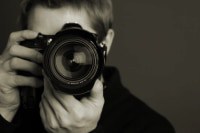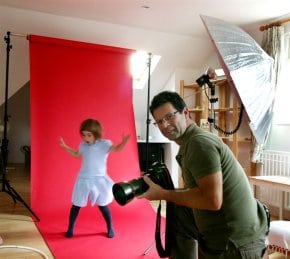Photography involves taking pictures of people or things for aesthetic enjoyment or commercial use in publications such as newspapers and magazines or on websites.
Photography requires a range of technical and creative skills as well as the ability to work well with people. Common tasks include:
- Using a range of digital or standard cameras to take pictures
- Using lighting equipment
- Working with clients to discuss and meet their needs on different projects
- Visiting different locations
- Preparing studios or locations
- Developing and editing pictures in preparation for publication
There are many different areas of photography to specialise in, including:
- Journalism
- Portrait
- Documentary
- Fashion
- Wedding
- Corporate/commercial
Salary
As most photographers work freelance, salaries are highly variable and depend on the level of expertise, the size of the project and so on.
As a photographic assistant you can earn from £100 – £150 per day.
Full time photographers could earn anything from £18,000 – £50,000 and above, with top end fashion, portrait and celebrity photographers making significantly more.
Responsibilities
Photographers are crucial in providing visual illustration for different purposes and it is said that a picture tells a thousand words.
It is remarkable that the language of photography is somewhat aggressive (shoot, capture and take are the most commonly used terms), something which touches on one aspect of the job as they hunt for new images, with the photographer trying to best position themselves in order to find special scenes or moments in the world.
However, it is also true that photography is never merely neutral or objective, and pictures are always produced in quite an active sense: photographers mix the basic subject material with technical and creative insight to produce an image, and then exploit the commercial value of that product.
Qualifications
Qualifications in photography help to provide a solid understanding of photography and technical practice.
Many people complete degrees in photography or shorter courses at art colleges before starting work, covering photography in general, vocational photography, photographic processing and other related subjects.
Both full and part-time courses are available and include:
- City & Guilds certificates
- BTEC HNDs
- Foundation degrees and courses
- Full university degrees
Some of these courses are more demanding in terms of qualifications, and may require relevant A-levels, GCSEs or a prior foundation course.
The British Institute of Professional Photography (BIPP) Professional Qualifying Examination (PQE) is well-respected and the organisation also offers good opportunities for networking with a mentor system to help new photographers.
For more information visit their website:
British Institute of Professional Photography (BIPP)
Jobs in photojournalism, working for a newspaper or magazine, may require a specific qualification recognised by the National Council for the Training of Journalists (NCTJ) – see website below for further details:
National Council for the Training of Journalists (NCTJ)
Further options for qualification include the NVQ in Photo Imaging (levels 2,3 and 4) or more specialised short courses run by the BIPP or the association of photographers:
Skills
Photographers need a keen visual eye to assess forms, colours, lighting and perspective.
They also need a good technical and creative instinct to exploit basic subject material.
Most photographers also require good people skills to get the best out of their subjects.
As most photographers work freelance basic business skills are useful, as is the ability to juggle commitments and schedules to maintain steady work in the face of a variable and changing working market.
Working Conditions
Photographers can work in a whole host of different locations, indoors and outdoors, at home and abroad, sometimes in glamorous, comfortable settings and sometimes in dangerous, hostile ones.
Working long or unsociable hours may come with the territory and even studio work can be hot and arduous, but for the most part photographers concentrate on producing the best photo possible, whatever the situation, and the working conditions are something most people enjoy.
Experience
Experience is important and as a photographer’s portfolio is evidence of their best work this is something that should be established at the earliest possible stage and then improved.
After gaining formal qualifications it is essential to build contacts and experience and the best way to do this is by becoming a photographic assistant, helping a professional photographer on shoots with everything from lighting to keeping clients happy.
Many people work for 3-5 years as an assistant before even beginning to work independently so it is important to be realistic about the time and commitment required from the job.
Employers
Major employers do exist in photography but mainly only in specialised, individual areas such as fashion or nature, or in the growing business of library or archive projects.
The biggest general employers are major newspapers, magazines and websites.
Career Progression
As most photographers work freelance the standard career path is to specialise in one kind of photography and start building a reputation for good work in this field and a business along with it.
Getting work published and winning awards is a good means to this end.
Image

Also known as…
- Freelance Photographer
Related Jobs
What’s it really like?
Matthew Ford, 52 is a freelance photographer workiong in London.
To see some examples of Matthew’s work and to find out more about his services visit his website:
How long have you been working as a photographer?
Over 25 years now, since I was 18 or 19.
I started working in so-called Fleet Street photography (essentially journalism photography), mostly for the Daily Mail.
Before that I was at art college in Birmingham where I was originally studying sculpture.
I started in newspaper journalism then moved to magazine journalism and ultimately ended up focusing on corporate photography and design, which is what I do now.
I have worked on various different projects over the years but I am now concentrating on building my business through a website, and I also do some photography consulting work with large corporations.
Ultimately a photographer has to aim to specialise and become known for one area of expertise and I have always enjoyed and had some contact with corporate work, so I am happy to concentrate on that.
What do you do in a typical day at work?
This highly depends on the status of my current projects.
My work involves meeting the photographic needs of large companies and a big part of this is supplying photos to back up publications showing what the company is doing.
If they have a successful new foreign division or are making the news for some reason, for example, I might be asked to provide pictures of the company boss, or new infrastructure.
This would mean travelling, usually with an assistant, and taking photos on location.
There is a large and growing division in photography between work that is commissioned specifically and library projects, where photographers display their work in an archive such as Getty Images or Corbis and clients then browse and select what they want to use.
The library side of photography is growing all the time and I help companies to understand these new systems and explain how they can use photography to help their business, and I also do editing work for them.
What do you like and dislike about the job?
The majority of photographers, me included, are freelance and this brings all the usual advantages and disadvantages of being self employed.
Personally, I love working in such a free and creative discipline.
Being able to work in such a variety of locations and with such a variety of people is something I value highly.
The fact that I have worked all my life in the same job is testament to how much I enjoy it, and now, having built up experience and contacts over the years, I am able to do more of what I want in the way of projects, which is great.
Perhaps the biggest downside is that the job can be insecure at times.
The amount of work required by the market fluctuates and if people decrease their spending and publishing then the amount of work available goes down as well (as may be seen in the current economic climate).
Clients often move around different photography companies and you have to be prepared to adapt and respond to such changes.
Any other advice?
Photography is very much a job of two parts, the technical and the personal.
You need to have the grounding and understanding of the nuts and bolts elements but you also need to be able to get the best out of people, both in front of the lens and in a business sense.
As such, I would advise people to get the grounding from qualifications and then start out as an assistant.
Being an assistant you learn all about the different areas of photography and begin to meet people and work your way into the photography scene.
There is always a need for good assistants and if you can be amenable, friendly and responsive then you can rely on finding work.
You will be expected to work hard and may do long hours but this is the best way to get to know the job.
Furthermore, contacts are absolutely key to the job and it is definitely who you know as much as what you know.









